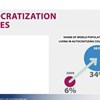virtuellt

Anna Lührmann: Walking the Talk. Which Parties Threaten Democracy?
The recent increase of democratic declines around the world has sparked a new generation of studies on the topic. Scholars agree that these days the main threat to democracy arises from democratically
74 predictions on moral and political development
How come today’s conservatives are more liberal than yesterday’s liberals? Why has the public opinion in large parts of the world shifted so rapidly in favor of gay and lesbian rights, but been virtua
Freedom as Non-domination and Democratic Inclusion
Res Publica. doi:10.1007/s11158-016-9348-8 Abstract According to neo-republicans, democracy is morally justified because it is among the prerequisites for freedom as non-domination. The claim that democ
Climate Change Denial among Radical Right-Wing Supporters
i: Sustainability The linkage between political right-wing orientation and climate change denial is extensively studied. However, previous research has almost exclusively focused on the mainstream righ= 2216), a mainstream right-wing party (the Conservative Party,,= 634), and a mainstream center-left party (Social Democrats,= 548) in Sweden. Across the analyses, distrust of public service media (Swedish Television,), socioeconomic right-wing attitudes, and antifeminist attitudes outperformed the effects of anti-immigration attitudes and political distrust in explaining climate change denial, perhaps because of a lesser distinguishing capability of the latter mentioned variables. For example, virtually all Sweden Democrat supporters oppose immigration. Furthermore, the effects of party support, conservative ideologies, and belief in conspiracies were relatively weak, and vanished or substantially weakened in the full models. Our results suggest that socioeconomic attitudes (characteristic for the mainstream right) and exclusionary sociocultural attitudes and institutional distrust (characteristic for the contemporary European radical right) are important predictors of climate change denial, and more important than party support per se.
Counterradicalization Interventions. A Review of the Evidence
Research report 2022/1, 70 p. Counter-radicalization has become part and parcel of the counter-terrorism strategies of virtually every western nation. Most counter-radicalization efforts build on the a
Counterradicalization Interventions. A Review of the Evidence
Counter-radicalization has become part and parcel of the counter-terrorism strategies of virtually every western nation. Yet despite the rapid diffusion of interventions, and the significant investmenCounter-Radicalization Interventions. A review of the evidence
Out of the Golden Cage: PR and the career opportunities of policy professionals
“Out of the Golden Cage: PR and the career opportunities of policy professionals”, Politics & Policy Vol 44 (1), 2016, pp 56-73. This paper focuses on a specific category of political actors – “pol
Anna Lührmann: Walking the Talk. Which Parties Threaten Democracy?
AbstractThe recent increase of democratic declines around the world -- what Lührmann and Lindberg(2019) have dubbed "third wave of autocratization'' -- has sparked a new generation of studies on the t
Offentliga samtal: Bilden av Sverige - en förebild eller ett land i kris?
På senare tid har fler beskrivit Sverige som ett land i kris. Inte sällan kopplas krisen till svensk integrationspolitik. Samtidigt får vi rapporter om att mycket överlag har blivit bättre i dagens Sv
New scientific model can predict moral and political development
Nature Human Behavior, one of the most influential social science journals, is now publishing a groundbreaking study from a Swedish team of researchers that answers several critical questions on how public opinion changes on moral issues, such as: How come today’s conservatives are more liberal than yesterday’s liberals? Why has the public opinion in large parts of the world shifted so rapidly in favor of gay and lesbian rights, but been virtually unchanged on other contested issues such as abortion rights? And is it possible to create a scientific model that can predict public opinion changes on moral issues?








